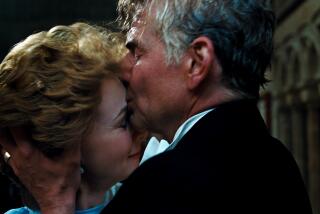Music Reviews : Schreier: Mastersinger at the Chandler Pavilion
- Share via
If indeed the art-song is the musical medium of the happy few, then those (a respectable number, considering the weather) who attended Peter Schreier’s recital at the Dorothy Chandler Pavilion on Tuesday were nothing less than ecstatic throughout a long and richly satisfying evening.
The German tenor, a trim, youthful-looking 53, does not deal in large gestures, vocally or dramatically. Understatement and intimacy characterize his artistry. His voice, basically whitish and light, has, however, acquired considerable heft over the years, while remaining true in tone and pitch. It is as ever an instrument at the service of an extraordinary musical intelligence.
A formally attired, bespectacled singer can cut a ludicrous figure when reciting the sorrows of the lovelorn shepherd of Schubert’s “Schafers Klagelied”--to cite a single example. However Schreier, with the slightest inclination of the head toward an imaginary mountain peak, a small hunching of the shoulders, an unemphatic outlining of the distant horizon with his hand, makes the listener not only see but believe.
The first half of the program was devoted to settings by Beethoven, Mozart and Schubert of Goethe poems. Of these, particular note must be taken of “Wonne der Wehmut,” one of the rare Beethoven songs that not only lies comfortably for the voice but in which the composer equals Schubert’s genius for getting at the heart of the poetic matter with a few swift, penetrating strokes. Schreier sang it as if to a handful of cherished, sympathetic friends, bringing them close to tears in the process.
The Schubert group began with one of the program’s few outbursts: the fiery “Rastlose Liebe,” passionately projected by the singer but compromised by the soft-grained, self-effacing accompaniment of Norman Shetler.
Not the least pleasure of Schreier’s Schubert--indeed of nearly everything he sings--is hearing the songs in their original, high keys rather than in the usual baritone transpositions, where a darkening element (which particularly affects the bass of the piano) can conflict with the texts’ intent.
After intermission, Schreier and Shetler turned to Schumann and poet Heinrich Heine: the familiar “Dichterliebe” cycle.
Without altogether minimizing the anguish of his poet’s love, the tenor took the piece whole, rather than as a series of ironic vignettes. This poet, he seemed to say (as, indeed, does Heine), is a survivor.
Again, in terms of singing, of diction and of effectively understated drama, Schreier’s interpretation was little short of ideal--up to the very last song, where measured tempo and exaggeratedly soft dynamics contradicted the poet’s defiant need to bury his past love and get on to the next one.
The audience was rewarded for its attentiveness and enthusiasm with three familiar encores, charmingly rendered: Schumann’s “Der Nussbaum” and by Schubert, “Standchen” and “Die Forelle.”
More to Read
The biggest entertainment stories
Get our big stories about Hollywood, film, television, music, arts, culture and more right in your inbox as soon as they publish.
You may occasionally receive promotional content from the Los Angeles Times.










